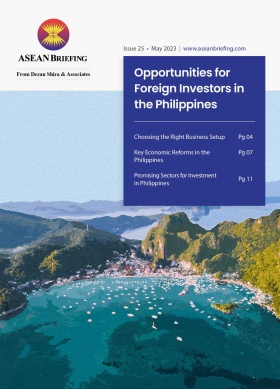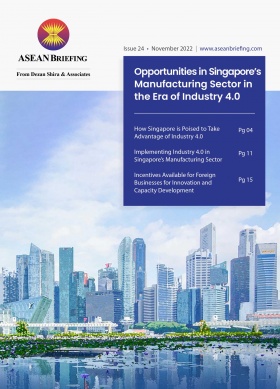A Guide to Value Added Tax in Indonesia
Value-added tax (VAT) in Indonesia is imposed on the provision of services or the transfer of taxable goods. Businesses are required to register for VAT once they reach an annual revenue of 4.8 billion rupiah (US$321,677). However, companies earning lower annual revenue can register voluntarily.
Indonesia is aiming to reform its tax system and optimize its tax revenue and collection.
The VAT rates are set out below:
- 11 percent imposed on most manufacturers, retailers, wholesalers, and importers from April 2022 and 12 percent by 2025.
- The export of tangible and intangible goods is subject to zero percent VAT.
- The export of services is subject to zero percent VAT.
Taxable goods and services include:
- Import of taxable goods;
- Delivery of taxable services or import of goods into a customs area;
- Consumption of taxable goods from outside the customs area in the customs area;
- Consumption of taxable services from outside the customs area in the customs area; and
- Export of taxable goods by a VAT-registered entity.
Goods and services not subject to VAT
The government sets out which goods and services are categorized as non-taxable.
Non-taxable goods
Non-taxable goods are the following:
- Food and beverages served in restaurants and hotels;
- Products obtained from drilling or mining, such as natural gas, crude oil, coal, gold ore, iron ore, coal, and copper ores;
- Commodities, such as rice, eggs, milk, fruit, tubers, meat, sugar, soybeans, and salt; and
- Gold bars, money used for government forex reserves.
Non-taxable services
Non-taxable services are the following:
- Religious services;
- Entertainment, hotel, parking, catering, and art services;
- Educational services;
- Medical and health services;
- Public transportation services;
- Financial services; and
- Labor services.
VAT refunds
All decisions related to VAT refunds are approved by Indonesia’s Directorate General of Taxes (DGT). Refund applicants undergo DGT audits, and results are typically issued within 12 months.
VAT reporting
Entities liable for VAT must settle their liabilities monthly. Businesses with multiple branches in different jurisdictions must register each branch with the relevant tax office due to the decentralized VAT regime.
VAT on digital services
The Indonesian has now obligated the VAT collection of VAT for digital services. This is set at the rate of 11 percent.
The following utilization of intangible goods will now be subject to VAT:
- The use of or right to exercise the copyright in the field of literature, art or scientific work, patent, design or model, plan, secret formula or process, trademark, or other forms of intellectual property right, industrial property right, or other similar rights.
- The utilization or right to use industrial, commercial, or scientific tools/equipment.
- Utilization of knowledge or information obtained from the scientific, technical, industrial, or commercial sectors.
- The use of additional or complementary assistance in the utilization or right to exercise the right as referred to in point (a), the utilization or right to use of the tools/equipment as referred to in point (b), or provision of knowledge or information as referred to in point (c).
- The use of or the right to use motion picture films, films, or videotapes for television broadcasting, or sound tapes for radio broadcasts.
- The acquisition of all or part of the rights relating to the use or granting of intellectual property rights, industrial property rights, or other rights as referred to in points (a) to (e).
The government recognizes the following e-commerce entities based on their activities. Both foreign and domestic e-commerce providers must collect VAT at the 11 percent rate if they fulfill certain criteria.
- Merchants (sellers): Businesses or individuals that conduct electronic offerings through electronic systems either managed or owned by themselves or through an e-commerce organizer.
- E-commerce organizers (PPMSE): Businesses or individuals that provide electronic systems to facilitate e-commerce transactions. These include business models, such as online streaming platforms, online marketplaces, online classified advertisements, and price comparison platforms.
- Intermediary Service Organizers (PSP): These are businesses or individuals that provide search system facilities (for example, Google, Bing) or those that provide information storage services (hosting and caching).
The aforementioned entities can be either domestic or foreign businesses and the legal requirements for each type will also differ.
Domestic merchants
Domestic merchants must obtain a business license from the government’s Online Single Submission (OSS) Agency. Under the country’s Standard Classification of Business Fields, businesses carrying out trading via the Internet need to comply with KBLI classification 4791.
Domestic e-commerce organizers
Businesses that operate their own e-commerce facilities are classified as PPMSEs and must obtain a special license named Surat Izin Usaha Perdagangan melalui Sistem Elektronik (business license for trading through an electronic system (SIUPMSE)).
The SIUPMSE can be applied through the OSS system and businesses will need to adhere to certain criteria to be eligible. These are:
- Obtaining an Electronic System Provider certificate within 14 days after the SIUPMSE is issued;
- Must provide a website and/or application name to the government;
- Must establish a consumer complaints section on their website/application, which includes an e-mail address and contact number in addition to the details of the Directorate-General of Consumer Protection and Trade Compliance;
- The PPMSE must provide facilities that inform or link customers to the OSS Agency’s website; and
- The business must submit its transaction data (subscribers, payments, complaints, contracts, shipments, etc.) to Statistics Indonesia (BPS), the government agency responsible for conducting statistical surveys.
Foreign merchants
Foreign merchants must provide a valid business license issued in the country where they are established to the domestic PPSME company which provides their electronic communication facilities. The domestic PPSME will then need to report all the transactional activities (subscribers, payments, complaints, contracts, shipments, etc.) of the foreign merchant to the BPS.VAT collectors
Foreign and domestic PPSMEs that have been appointed as a ‘VAT collector’ by the Ministry of Finance are obligated to charge the 11 percent VAT rate on the sales of digital products to Indonesian consumers.
They must first have local transaction values of the following:
- The PPSME has completed transactions with Indonesian consumers that exceed 600 million rupiah (US$40,352) in a year or 50 million rupiah (US$3,362) per month; or
- Traffic or visitors to the e-commerce site exceeds 12,000 users per year or 1,000 users per month.
VAT exemption
Certain imports can be exempted from VAT. These include:
- The import of taxable goods into free trade zones;
- Import of services and goods financed by foreign aid;
- Import of raw materials by companies in bonded zones; and
- Imports that are made by companies in specific industries such as national airlines.
Webinar – Doing Business in Indonesia 2024: Elections, Industry Trends & Capital City Relocation
Live Session for Asia: March 27, 2024
10 AM Brussels / 4 PM Jakarta / 5 PM China
Rebroadcast for North America: March 27, 2024
9 AM Los Angeles / 12 PM New York / 6 PM Brussels
Join us for a recap of Indonesia’s economic performance in 2023, key industry trends in 2024, implications of the 2024 general election results for businesses and updates, and Indonesia’s new capital city, Nusantara.
This webinar is FREE of charge.
Register now for Indonesia’s Live Session
Register now for North America’s Rebroadcast
About Us
ASEAN Briefing is produced by Dezan Shira & Associates. The firm assists foreign investors throughout Asia and maintains offices throughout ASEAN, including in Singapore, Hanoi, Ho Chi Minh City, and Da Nang in Vietnam, in addition to Jakarta, in Indonesia. We also have partner firms in Malaysia, the Philippines, and Thailand as well as our practices in China and India. Please contact us at asean@dezshira.com or visit our website at www.dezshira.com.








